Prevention is the most effective weapon against contagion. We are currently receiving an overload of information aimed at reducing risks of transmission and prevention against the novel Coronavirus epidemic.
Please find below the National Health System handbook of approved rules and practices to be applied in homes, public places and offices.
National Health Service Vademecum
1. Masks help to limit the spread of the virus by those affected but must be used in addition to other good hygiene measures such as thorough hand washing for at least 20 seconds. Wearing multiple overlapping facemasks does not give extra protection.
2. Avoid close contact with people suffering from acute respiratory infections and distance yourself (for at least 1 metre) from other people who have coughs, colds or fevers.
3. Do not touch your eyes, nose and mouth with your hands to avoid contamination and transmission of the virus.
4. Cover your mouth and nose with a tissue when you cough or sneeze, then throw it in the bin and wash your hands. If you do not have a tissue, cough or sneeze into your elbow. In case of an acute respiratory infection, avoid close contact with other people, wear a mask and wash your hands thoroughly.
5. Do not take antiviral drugs or antibiotics unless they are prescribed by your doctor: antibiotics do not work against viruses, only against bacteria.
6. Clean all surfaces with appropriate cleaners, sanitizers and disinfectants Ask for doctor and pharmacist advice.
7. Use a face mask only if you suspect you have contracted the novel coronavirus and have coughing or sneezing symptoms or if you are caring for a person with suspected coronavirus infection (recently returned from China with respiratory symptoms).
8. Products MADE IN CHINA and packages received from China are NOT dangerous because the novel coronavirus is unable to survive on surfaces for a long period.
9. Contact the toll-free number 1500 for information if you have a fever or a cough and have returned from China in the last 14 days. Wear a mask, use disposable tissues and wash your hands thoroughly if you are in contact with other people.
10. Household pets do not spread the new coronavirus but it is always better to wash your hands thoroughly after contact.
The National Health Service also adds some other useful precautions particularly relevant to the workplace:
• DO NOT go to your workplace if you have flu symptoms (fever, cough and cold);
• Inform the management if, in the last 14 days, you have entered or left the municipalities/areas subject to public ordinances, or countries most affected by the epidemic;
• Follow the company's instructions regarding all travel;
• In the case of contact with documents or material delivered by external customers, follow good hygiene practices by washing your hands thoroughly;
• Correctly use any protective masks that may be provided by the company;
• Postpone meetings (if possible);
• Avoid crowded places (e.g. canteens, shopping centres, etc.).





